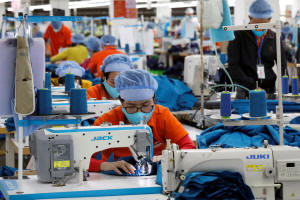Analysis: Vietnam's anti-graft crackdown chills supply chains,
investment
 Send a link to a friend
Send a link to a friend
 [November 28, 2022] By
Francesco Guarascio [November 28, 2022] By
Francesco Guarascio
HANOI (Reuters) - An anti-corruption drive in Vietnam has paralysed many
routine transactions in the country, causing shortages of essential
goods and dampening investor confidence in one of Asia's fastest growing
economies.
The Chinese-style campaign against graft has been under way since 2016,
but a series of recent scandals have sparked new wide-ranging
investigations, unnerving government officials who now fear being
accused of corruption and are reluctant to greenlight procurement and
investment.
That chill has disrupted imports of drugs and petrol and investments in
crucial energy and manufacturing projects, politicians, diplomats and
executives said, in an economy that has become an increasingly important
part of the global supply chain.
In the healthcare sector, about 65% of large hospitals have experienced
shortages of drugs and medical products in recent months, mostly due to
officials' reluctance to approve procurement contracts, according to the
government.
Marko Walde, head of the German chamber of commerce in Vietnam, warned
the situation could worsen if licences for thousands of drugs set to
expire at the end of the year were not quickly renewed by regulators.

"If you don't do anything, you cannot do a mistake," Walde said of the
current licensing paralysis caused by the bureaucratic anxiety.
Germany is the second-largest exporter of drugs to Vietnam after France,
according to 2020 data.
A European Commission document released in October about the bloc's free
trade deals lists Vietnam's "cumbersome" rules on renewal of
pharmaceuticals' licences and their implementation among the main
outstanding issues in the country.
The drug shortages include antibiotics for critically ill patients,
cardiovascular drugs and medicines to treat the worst symptoms of dengue
fever amid a surge of cases.
Queues are not uncommon at pharmacies in the country and one physician,
who asked not to be named, said private clinics have also been affected.
Similar supply kinks affect other parts of the economy.
An executive at an industrial developer, who declined to be named, said
projects involving medium-sized investors were repeatedly delayed
because of missing signatures from officials.
Businesses say that could delay crucial foreign investment in a country
that relies on external funding to sustain its export-oriented economy
and is expected to be among the top beneficiaries of multinationals'
plans to reduce their exposure to China.
Global supply chains that increasingly rely on Vietnam, including for
electronics and footwear, may be affected, compounding the negative
impact of a global slowdown in orders, which has already led to cuts in
the workforce in Vietnam.
Partly because of that, growth in new foreign manufacturing projects is
expected to stall this year from last year, far below pre-pandemic
levels, according to BW Industrial, a leaser of factories and warehouses
to manufacturers.
An October survey by the European Chamber of Commerce in Vietnam shows
sentiment among managers in the country worsened in the third quarter
when corruption probes intensified and despite very high economic
growth.
[to top of second column] |

Labourers work at Hung Viet garment
export factory in Hung Yen province, Vietnam December 30, 2020.
REUTERS/Kham/File Photo

PARALYSIS
Vietnam is ranked 87th in the latest corruption perception list of
180 nations compiled by Transparency International, a watchdog,
around the same level as Ethiopia and Colombia.
While fighting bribery is broadly considered positive in the
long-term, short-term disruptions can paralyse business, especially
if enforcement is seen as opaque and politically driven.
As investigations multiply, officials fear they could be caught if
they inadvertently break rules, which are often badly written and
hard to interpret.
The procurement and licensing problems currently in the
pharmaceutical sector follow arrests of high-ranking officials last
year for the purchase of COVID-19 treatments at inflated prices and
for graft in the organisation of repatriation flights for Vietnamese
citizens stranded abroad during the pandemic.
The government did not respond to a request for comment about the
anti-corruption drive, but top officials, including Prime Minister
Pham Minh Chinh, have repeatedly urged administrators not to hamper
the economic activity by delaying procurement decisions.
It is unclear whether the ruling Communist Party would reduce
pressure, a Hanoi-based diplomat said, as some leaders see
corruption in some sectors as an existential threat.
However, officials publicly acknowledge the bottlenecks.
"State cadres and civil servants, including leaders, do not dare to
work because if they do, they are afraid of making mistakes,"
lawmaker Nguyen Huu Thong warned the National Assembly late in
October.
SUPPLY SHOCKS
The negative economic consequences of the crackdown come on top of
other challenges that Vietnam and other countries in Asia face,
namely a weakening local currency, global supply constraints and
declining world demand.
Vietnam's benchmark stock index is among the world's worst
performers this year amid a credit freeze sparked by a series of
arrests of real estate developers for alleged wrongdoing.

"The corruption campaign is causing increasing uncertainty and
anxiety among the ranks and files in everyday business dealing and
approvals in Vietnam," said John Rockhold, chairman of environmental
consulting and investment firm Pacific Rim Investment and
Management.
He said delays in approving long-awaited energy projects were
contributing to power shortages, with some manufacturers needing to
postpone production to weekends and nights to reduce pressure on the
grid.
Ha Hoang Hop, a visiting senior fellow at Singapore-based
ISEAS-Yusof Ishak Institute, also attributed a shortage of petrol to
the panic caused by corruption investigations.
"The crackdown won't be able to root out the widespread corruption
if implemented without complete transparency and rule of law," said
Hop.
(Reporting by Francesco Guarascio @fraguarascio; Additional
reporting by Khanh Vu; Editing by Sam Holmes)
[© 2022 Thomson Reuters. All rights
reserved.]
This material may not be published,
broadcast, rewritten or redistributed.
Thompson Reuters is solely responsible for this content. |